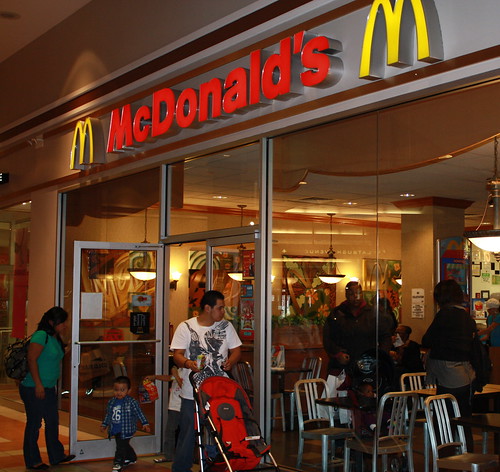The Atlantic Terminal mall, one of Brooklyn’s hottest student hangouts, has a unique policy: no groups of four or more people under the age of 21 may enter. After two months of strict enforcement, businesses are cheering, saying a mall with fewer teenagers has been a boost to business.
“I think it’s fabulous,” Alyssa Jenkins, supervisor at Madee clothing store, said of the policy’s impact since the school year began. “The kids come in and they’re terrorizing the store, they’re stealing, they’re being loud and obnoxious for no reason. People wonder why it’s so loud and want to leave. They make it hard for other people to shop.”
Enforcement of the policy is heaviest on weekends and holidays, and around 3 p.m. on weekdays, when schools end and teenagers seek a place to eat and socialize. While the policy has been in effect since the mall opened in 2004, official presence increased after November of 2009, when a stabbing and two shootings occurred on nearby streets after thousands of adolescents flocked to Buffalo Wild Wings. Now to prevent mobs and loitering, this school year the policy is strictly enforced by both mall security and four NYPD officers monitoring minors in and around the mall, asking groups of four or more unescorted by an adult to break into smaller groups or leave.
“Here lots of kids get in trouble,” said Officer Max Saitep, one of the NYPD officers in the 88th Precinct assigned to work in the Atlantic Terminal mall at the intersection of Flatbush and Atlantic Avenues. “There are fights all the time. If they let them go, it gets out of hand pretty quickly. But the security here is really good and they’ve been keeping it under control.”
Teen conflict impacts the shopping experience for clients of all ages at the four-story mall with approximately 30 businesses, according to mall employees. “There’s danger!” said Yorvelin Martinez, a cashier at McDonald’s, as about 30 students waited in line to place orders during the after-school rush. “There have been fights right out here. Every time they come here they’re reckless, they’re making noises and very rude, and it’s bad for other customers. This is a business to eat at, not a park or just someplace to hang out.”
Teenagers claim that they mean no harm, and are simply looking for a place to meet with friends and get food during their free time. “We don’t do anything, we just sit there and eat,” said Cristina Net, a 16-year old student who sat on the pavement outside the mall with a box of chicken wings and a group of six friends. “If we want to go get our food, we’re not allowed to go get it. We have to go around and enter from other sides of the mall and meet up inside. The cops are real rude and they ask us to leave. Sometimes they don’t even let us sit outside.” Net’s friend, a 16 year-old male student who goes by “Tiger,” adamantly added, “I should be able to eat my Wild wings and also sit down at a table.”
Food businesses, primary attractions for teenagers, are most vulnerable economically to the entrance restrictions. “There are less teenagers in the mall,” admitted Tasha, a Subway employee who did not want to give her last name because she was not authorized to speak to the media. “We had crowds of kids after school last year, and this year they don’t come in. Some of them can be rowdy, but some just want to eat.”
Still, despite the loss of some teenage customers, most mall employees said the less chaotic shopping atmosphere, fostered by the new enforcement, was worth it. “We will have less customers because people can’t come in with their friends,” said Will Taylor, a back stocker at Target. “Then again, it will stop them from just lounging around. They’re calmer in separate groups.”
Photo: Employees at McDonald’s worry that rowdy teenagers bother customers of all ages, particularly parents who bring their children in for a meal.

